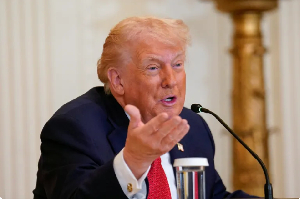Deputy Minister of Food & Agriculture, Hannah Louisa Bissiw, has officially launched two new fertiliser products into the Ghanaian agricultural sector aimed at increasing soil fertility to boost farm produce.
The fertilisers; Magic Leon and Black Diamond, manufactured by Organiksa -- a giant fertiliser manufacturer in Turkey -- will be distributed in the country and other West African markets by the Shaaba Group Ltd, a Ghanaian construction and processing company.
The two products have been manufactured with high capacity to improve the structure of soil, and prevent high water and nutrient losses in light and sandy soil.
The products also help increase the water-holding capacity of soil and helps resist drought, while darkening the color of the soil to help absorption of the sun energy.It also helps reduce the presence of toxic substances in soil.
Launching the fertilisers in Accra, Dr. Bissiw urged farmers in the country to patronise the new fertilisers to boost their yield. She pledged government’s support for the new products and urged farmers to patronise them.
Chairman of the Shaaba Group Dr. Seth Adjei Baah explained that research-testing and efficacy of trails have proven the Magic Leon and the Black Diamond contributes greatly to plant growth, root development, soil remediation, higher yields and results in overall healthy agriculture production.
“The products’ distinction is in the fact that they contain higher percentages of the beneficial humic acid components, with below detectable levels of the undesirable trace elements. This is an uncommon feat, especially because the products are the most competitively priced on the market.”
He indicated that over the years Ghana’s development strategies have highlighted modernisation.
“Until recently, the agriculture sector has been the bedrock of the Ghanaian economy, dominating in terms of its contribution to Gross Domestic Product (GDP) and employment. Unfortunately, fortunes of the agriculture sector have dwindled in recent years.
“The agriculture sector, which used to contribute about 40 percent to Ghana’s GDP and employ about 60 percent of the total labour force in the country, currently accounts for a little over 22 percent of the country’s gross domestic product and 50 percent of national employment.
“There is therefore an urgent need to reverse these worrying trends if the country is to meet the Millennium Development Goals of halving poverty and eradicating hunger by 2015,” he said.
Business News of Wednesday, 5 February 2014
Source: B&FT













